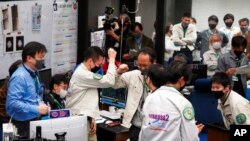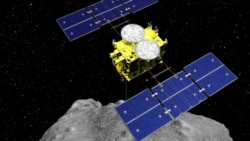Japan's space agency said its helicopter search team on Sunday retrieved a capsule carrying asteroid samples after it successfully landed in a remote area in southern Australia as planned.
The spacecraft Hayabusa2 released the small capsule on Saturday and sent it toward Earth to deliver samples from a distant asteroid that could provide clues to the origin of the solar system and life on our planet, the Japan Aerospace Exploration Agency (JAXA) said.
"The capsule collection work at the landing site was completed," the agency said in a tweet about four hours after the capsule landed. "We practiced a lot for today ... it ended safe."
The return of the capsule with the world's first asteroid subsurface samples came weeks after NASA's OSIRIS-REx spacecraft made a successful touch-and-go grab of surface samples from asteroid Bennu. China, meanwhile, announced this week that its lunar lander had collected underground samples and sealed them within the spacecraft for return to Earth.
Early Sunday, the capsule briefly turned into a fireball as it reentered the atmosphere 120 kilometers (75 miles) above Earth. About 10 kilometers (6 miles) above ground, a parachute was opened to slow its fall, and beacon signals were transmitted to indicate its location.
'So impressed'
"It was great. … It was a beautiful fireball, and I was so impressed," said JAXA's Hayabusa2 project manager Yuichi Tsuda as he celebrated the successful capsule return and safe landing from a command center in Sagamihara, near Tokyo. "I've waited for this day for six years."
About two hours after the capsule's reentry, JAXA said its helicopter search team found the capsule in the planned landing area. The retrieval of the pan-shaped capsule, about 40 centimeters (15 inches) in diameter, was completed about two hours later.
The fireball could be seen from the International Space Station. Japanese astronaut Soichi Noguchi, who is now on a six-month mission there, tweeted: "Just spotted #hayabusa2 from #ISS! Unfortunately not bright enough for handheld camera, but enjoyed watching capsule!"
Hayabusa2 left the asteroid Ryugu, about 300 million kilometers (180 million miles) away, a year ago. After it released the capsule, it moved away from Earth to capture images of the capsule descending toward the planet as it set off on a new expedition to another distant asteroid.
Australian National University space rock expert Trevor Ireland, who was in Woomera for the arrival of the capsule, said he expected the Ryugu samples to be similar to the meteorite that fell in Australia near Murchison in Victoria state more than 50 years ago.
"The Murchison meteorite opened a window on the origin of organics on Earth because these rocks were found to contain simple amino acids as well as abundant water," Ireland said. "We will examine whether Ryugu is a potential source of organic matter and water on Earth when the solar system was forming, and whether these still remain intact on the asteroid."
Scientists say they believe the samples, especially ones taken from under the asteroid's surface, contain valuable data unaffected by space radiation and other environmental factors. They are particularly interested in analyzing organic materials in the samples.
Clues about distribution
JAXA hopes to find clues to how the materials are distributed in the solar system and are related to life on Earth. Yoshikawa, the mission manager, said 0.1 gram of the dust would be enough to carry out all planned research.
For Hayabusa2, it's not the end of the mission it started in 2014. It is now heading to a small asteroid called 1998KY26 on a journey slated to take 10 years one way, for possible research including finding ways to prevent meteorites from hitting Earth.
So far, its mission has been fully successful. It touched down twice on Ryugu despite the asteroid's extremely rocky surface, and successfully collected data and samples during the 1½ years it spent near Ryugu after arriving there in June 2018.
In its first touchdown in February 2019, it collected surface dust samples. In a more challenging mission in July that year, it collected underground samples from the asteroid for the first time in space history after landing in a crater that it created earlier by blasting the asteroid's surface.
Asteroids, which orbit the sun but are much smaller than planets, are among the oldest objects in the solar system and therefore may help explain how Earth evolved.
Ryugu in Japanese means "Dragon Palace," the name of a sea-bottom castle in a Japanese folk tale.





